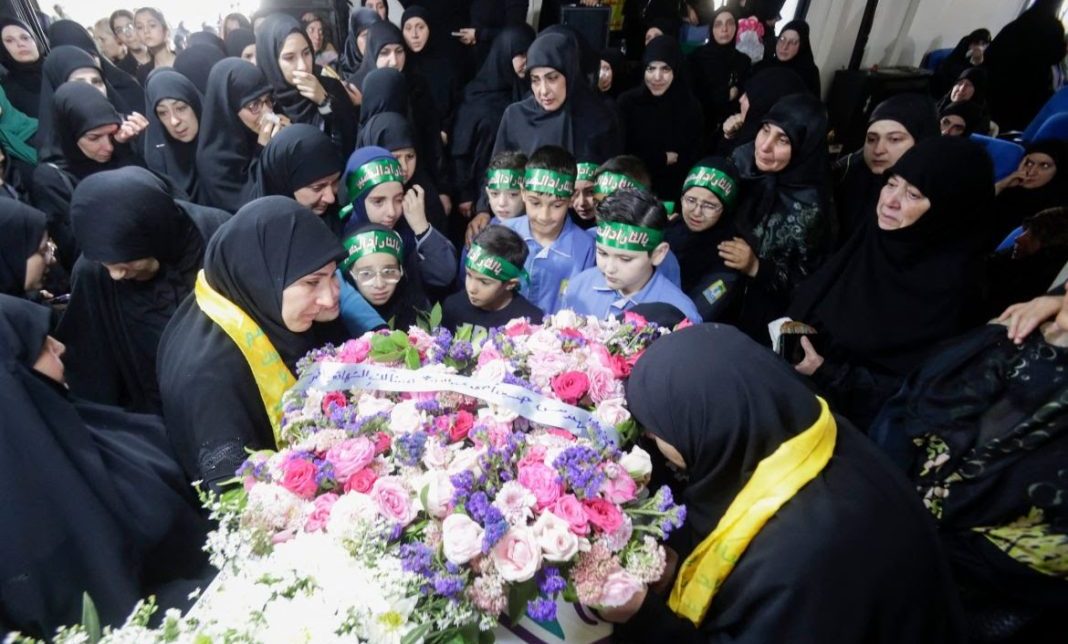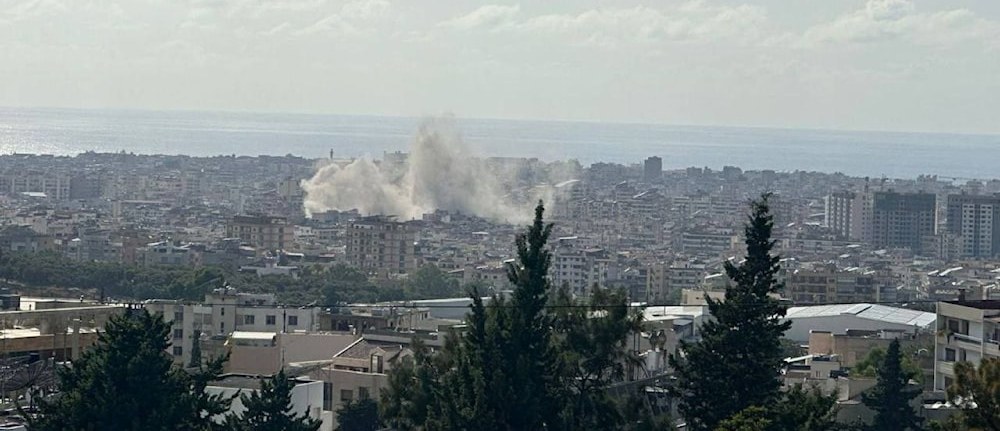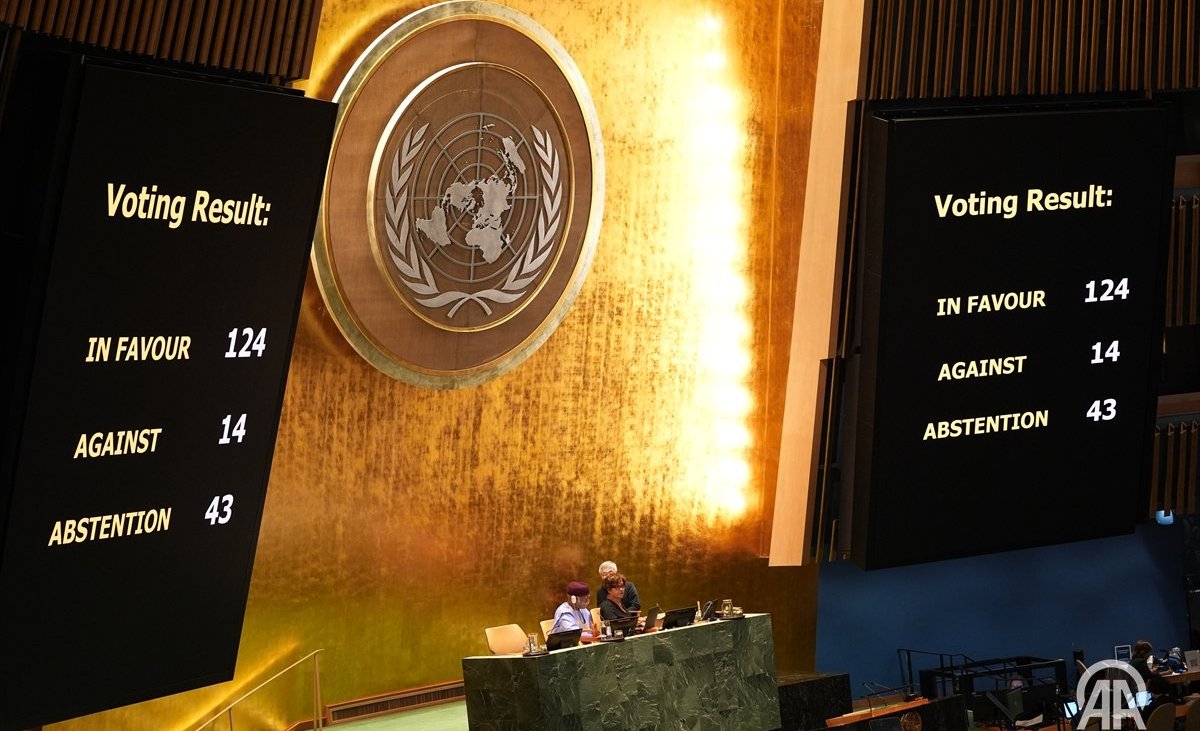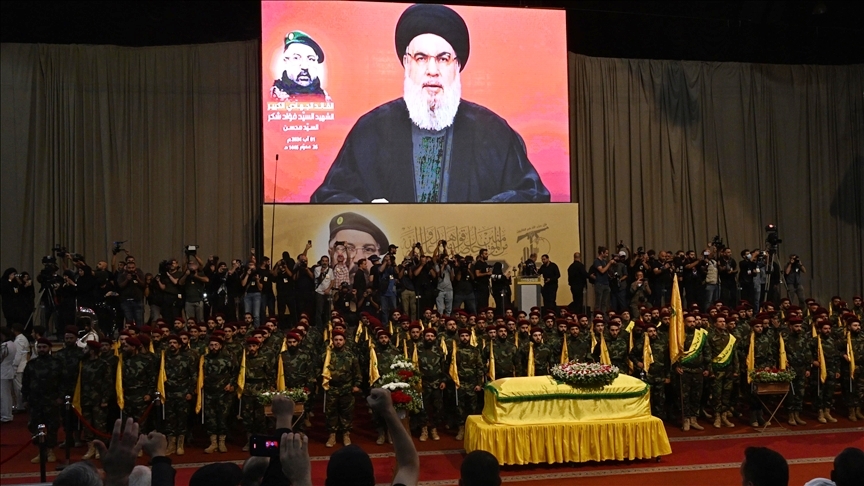September 20, 2024
Condemn Israeli Terror Attacks in Lebanon
Free Palestine! End the Occupation!
 Funeral for victimn of Israeli terror attack in Lebanon
Funeral for victimn of Israeli terror attack in Lebanon
• Hezbollah Secretary-General Sayyed Hassan Nasrallah Addresses Recent Terror Attacks
• Letter from Political Bureau of Lebanese Communist Party Regarding Recent Zionist Attacks
• UN General Assembly Vote Calls on Israel to End
Occupation of
Palestine
Israeli Terror Attacks in Lebanon
Hezbollah Secretary-General Sayyed Hassan Nasrallah Addresses Recent Terror Attacks
Hezbollah Secretary-General Sayyed Hassan Nasrallah on September 18 offered his condolences to the families of those martyred or wounded in the deadly attack involving pagers rigged by the Israeli Zionists. Nasrallah referred to the incident as a "major terrorist operation, an act of genocide and massacre," amounting to a "declaration of war."
The attack on the first day, September 17, involved the detonation of thousands of pagers. Nasrallah said it was conducted "without regard for any regulations or morals." He also addressed the attack the following day that saw the Israeli occupation detonating thousands of handheld radios, or walkie-talkies, labeling it a second attempt by the Israeli occupation to kill thousands.
Over two days, the Israeli enemy sought to kill more than 5,000 people "in two minutes without regard for anything," he said. He further condemned the indifference shown by the attackers toward the civilian locations where many of the individuals carrying the devices were present. He expressed gratitude for the efforts made by the people to mitigate the severity of the injuries.
The Resistance leader stressed that the aggression resulted in "dozens of martyrs, including women and children," with thousands more wounded. "The real scale of the aggression will show with time," Nasrallah said.
In his remarks, the Hezbollah leader highlighted the meticulous planning of the attack, explaining that the enemy had rigged 4,000 pagers with the clear intent of killing 4,000 people in a single minute. Despite the severity of the attack, many injuries were fortunately minor, with a number of pagers out of service or not distributed at all at the time of the explosion, he said.
Describing the assault as a "grand terrorist operation," Nasrallah said, "We have formed investigative committees and are closely examining all possible scenarios, hypotheses, and possibilities." He added that the investigation will scrutinize every aspect of the attack, from the factory where the devices were produced to how they ended up in the hands of the users, with the end goal of reaching a definitive conclusion.
"There is no doubt that we were subjected to a major blow on a security and humanitarian level that is unprecedented in the history of our Resistance," he said. "We were dealt a major blow, but that is war. We acknowledge that the enemy has technological supremacy, especially as it is backed by the United States and the collective West."
"We will grow more steadfast and determined to overcome all perils, and it is of great importance that such blows do not undermine our will," he said. He also praised the effectiveness of the Lebanese front in pressuring the Israeli occupation, as evidenced by its recent actions and statements.
Effectiveness of Northern Front
When he addressed the Lebanese people and the world on September 18, Hezbollah Secretary-General Nasrallah said the Resistance Movement's Northern Front is the bane of the Zionists.
Emphasizing the effectiveness of the Northern Front, Nasrallah said, "The enemy labeling the situation in the north as the first historic defeat for 'Israel' is further evidence of our front's effectiveness." Moreover, he noted that the mobilization of Israeli forces in the north highlights the "grave threat it faces on this front," which he described as one of the most important fronts in the ongoing regional war of attrition.
"The enemy has admitted to losing the north, forcing Prime Minister Benjamin Netanyahu and Security Minister Yoav Gallant to find a solution to the predicament constituted by the Northern Front," Nasrallah added. According to the Resistance leader, this front serves as "one of the most important trump cards in the hands of the Palestinian Resistance in the negotiations to halt the aggression on Gaza."
Nasrallah also revealed that Hezbollah had faced "paramount pressures and numerous threats" aimed at halting operations on the Northern Front, with the detonation of communication devices over the span of September 17 and 18 being a part of these efforts. "We were informed through numerous official and unofficial channels on Tuesday [September 17] of the need to stop supporting Gaza and firing into 'Israel' from the north," he stated. However, he affirmed Hezbollah's resolve, saying, "We must not succumb to these threats nor halt our support for Gaza."
The Hezbollah leader also warned that the Israeli occupation's actions would further exacerbate the displacement of settlers from the north and reduce the possibility of their return. "What you are doing will increase the displacement of your displaced settlers from the north and will bar the opportunity of their return," he warned. He also reaffirmed Hezbollah's commitment to supporting Gaza, the West Bank, and the Palestinian people, declaring that the Resistance "will ensure that the enemy fails to achieve its goals."
Nasrallah praised the high spirits and steadfastness of those wounded in the September 17 and 18 attacks, emphasizing their resolve to return to the battlefield. He also noted that the Israeli occupation had aimed to "destroy the Resistance's infrastructure and affect as many leaders as possible while causing paramount chaos and weakness, which it failed to achieve."
Israeli Leadership Leading It to Abyss
Addressing the broader strategy of Israeli leadership, Nasrallah questioned Netanyahu's ability to resolve the displacement crisis in the north, stating, "Can Israeli Prime Minister Benjamin Netanyahu return the settlers to the north? We are taking this on as a challenge knowing full well they can't, regardless of the course of action they take."
He pointed out that the only way the enemy could return the displaced settlers would be to halt the aggression on Gaza and the occupied West Bank. Sayyed Nasrallah vowed that the Lebanese front would not cease its operations until the aggression ends, "regardless of the prospective sacrifices and repercussions."
He criticized Israeli military strategy, particularly the suggestion by the northern command to establish a security belt. "The foolish commander of the northern command's suggestion to establish a security belt is making us hope they do go ahead with it so that their tanks would be easier to hit," he remarked. He added that Hezbollah was "thoroughly looking for their tanks" and welcomed any such movement, viewing it as a "golden, historical opportunity" to strike.
"If the enemy establishes a security belt, it must understand that it will be ambushed and the zone will turn into a swamp and a quagmire in which it will be mired," Nasrallah warned. "The retaliation the Israelis will face will remain a well-kept secret within our closed circles, and they will hear nothing of it until the time comes."
Nasrallah criticized the leadership of Netanyahu and Gallant, accusing them of "egoistical, chaotic, and foolish leadership" that would "lead the occupation into the abyss and the collapse of the third tempele."
The Resistance leader pledged that the Israeli occupation would face a resounding act of retaliation in both predictable and unforeseeable manners. "The response will be just and perplexing."
(Al Mayadeen English)
Letter from Political Bureau of Lebanese Communist Party Regarding Recent Zionist Attacks

Israeli airstrike, September 20, 2024 on Beirut, Lebanon.
The Political Bureau of the Lebanese Communist Party addressed the following letter to fraternal parties and organizations.
While the genocidal war waged by the Israeli occupation army against the Palestinian people in the Gaza Strip continues, along with its brutal attacks on the West Bank and several countries in the region, the occupation is targeting Lebanon, particularly the south, with repeated daily assaults. These attacks occur under the comprehensive cover of imperialist governments, led by the United States of America, resulting since October 7 to this day in the documented deaths of more than 43,000 martyrs in Gaza and over 700 martyrs from our country, Lebanon.
In this context, the recent escalation in Lebanon includes the targeting of thousands of pager devices on September 17, followed by wireless radio devices on September 18. This led to the death of 32 martyrs and about 3,000 injured after these devices exploded in the hands of their carriers, in safe homes, and institutions. This was a described terrorist attack that targeted users of communication devices, including civilians, resistance fighters, and workers in health and social institutions, after these devices were booby-trapped with explosives by Mossad agents before being imported into Lebanon.
These terrorist attacks aim to intimidate the Lebanese people and force them to submit to the conditions of the Zionist enemy and its backer, the United States, preventing Lebanese national forces from supporting the Palestinian people in Gaza. They also seek to tighten security control over the entire region, cement the influence of imperialist powers over oil resources and trade routes, and maintain Israel's qualitative military and security superiority, as Israel serves a crucial role in this broader project.
International solidarity with the Lebanese people and their right to resist the occupation is required today more than ever, as is the condemnation of Israeli aggression on its territories, and the continuation of the solidarity campaign with the Palestinian people to stop the genocidal war against them.
The Political Bureau of the Lebanese Communist Party counts on the support of communist, workers, and progressive parties for its just cause and their readiness to act in solidarity with Lebanon, Palestine, and the peoples of the region. It calls on these parties to raise their voices in their countries, in their statements, movements, and especially in political and popular actions in front of Israeli and U.S. embassies, as well as in national and regional parliaments, and various international institutions. They are also called upon to provide aid to health and social organizations to support the resilience of the Lebanese people.
- For the immediate cessation of the genocidal war in Gaza and the aggression on Lebanon and other countries in the region.
- For the strengthening of international solidarity between peoples.
- For the confrontation of imperialist and Zionist wars and aggressions.
The Political Bureau of the Lebanese Communist Party
(September 19, 2024)
Free Palestine! End the Occupation!
UN General Assembly Vote Calls on Israel to End Occupation of Palestine

On September 18, the United Nations General Assembly (UNGA) overwhelmingly adopted a resolution calling for an end to the Israeli occupation of Palestinian territories within a year and the imposition of sanctions for non-compliance.
The UNGA resolution was adopted by a vote of 124 countries in favour, 14 against and 43 abstentions, including Canada.
As many countries pointed out when they addressed the resolution, it affirms the justice of the Palestinian cause, and represents broad international recognition of the Palestinian people's right to self-determination as a natural, legal and historical right. The resolution takes a clear position that occupation "cannot be allowed to continue any longer."
Here are some of the reactions to the vote from countries and international organizations:
Palestine's ambassador to the UN Riyad Mansour called the vote a turning point "in our struggle for freedom and justice." "It sends a clear message that Israel's occupation must end as soon as possible and that the Palestinian people's right to self-determination must be realized," he said.
Predictably, the U.S. Ambassador to the UN called the resolution "one-sided," pointing to its failure to recognize that Hamas, "a terrorist organization," still exerts power in Gaza and that Israel "has a right to defend itself." This flies in the face of the fact that an occupying power has no such inherent right and that Israel has no rights because since it was founded it is in violation of the conditions contained in its founding resolution.
"This resolution will not bring about tangible progress for Palestinians," the U.S. Ambassador said. "In fact, it could both complicate efforts to end the conflict in Gaza and impede reinvigorating steps toward a two-state solution, while ignoring Israel's very real security concerns."
Israel's ambassador to the UN said the vote was "a shameful decision that backs the Palestinian Authority's diplomatic terrorism."
"Instead of marking the anniversary of the October 7 massacre by condemning Hamas and calling for the release of all 101 of the remaining hostages, the General Assembly continues to dance to the music of the Palestinian Authority, which backs the Hamas murderers," he said.
Jasem Mohamed al-Budaiwi, the secretary-general of the Gulf Cooperation Council (GCC) –- which includes Bahrain, Kuwait, Oman, Qatar, Saudi Arabia, and the United Arab Emirates –- welcomed the UNGA's call on Israel to end its occupation of Palestine.
He said it confirmed "the right of the Palestinian people to reclaim their occupied lands" and showed that Israel's actions, including the expansion of settlements, lack recognition at regional and international levels.
The Organization of Islamic Cooperation (OIC), which comprises 57 mostly Muslim-majority states, said the decision by the UNGA "expresses the international consensus" on the Palestinian right to self-determination and the establishment of an independent and sovereign state, according to the Palestinian news agency Wafa.
It also called on the global community to "take individual and collective measures" to ensure that Israel complies with its obligations under international law.
European Union foreign policy chief Josep Borrell said in a statement: "The UN General Assembly has forcefully reaffirmed its commitment to the realization of the right of the Palestinian people to self-determination, including its right to an independent and sovereign State, living side by side in peace and security with Israel, in accordance with the relevant resolutions of the UN Security Council and the UN General Assembly."
The vote further isolates Israel ten days before the heads of state and government are due to attend the Annual General Assembly session on September 28.
(UN News)
Text of UN Resolution
The UN resolution (UN A/ES-10/L.31.Rev1) adopted by the General Assembly on September 18 was drafted and submitted by Algeria, Bahrain, Bangladesh, Bolivia (Plurinational State of), Chile, Colombia, Democratic People’s Republic of Korea, Djibouti, Egypt, Guyana, Iraq, Jordan, Kuwait, Libya, Malaysia, Mauritania, Morocco, Namibia, Nicaragua, Oman, Pakistan, Qatar, Saudi Arabia, Senegal, South Africa, Sudan, Türkiye, Uganda, Yemen and State of Palestine. It says:
The Assembly "strongly deplores the continued and total disregard and breaches by the Government of Israel of its obligations under the Charter of the United Nations, international law and the relevant United Nations resolutions, and stresses that such breaches seriously threaten regional and international peace and security."
It also recognized that Israel "must be held to account for any violations of international law in the Occupied Palestinian Territory, including any violations of international humanitarian law and international human rights law, and that it must bear the legal consequences of all its internationally wrongful acts, including by making reparation for the injury, including any damage, caused by such acts."
The General Assembly highlighted the need for the establishment of an international mechanism for reparations for damage, loss, or injury caused by Israel's actions. It also called for creating an international register of damage caused, to document evidence and related claims.
The resolution also includes a decision to convene an international conference during the Assembly's current session to implement UN resolutions pertaining to the question of Palestine and the two-State solution for the achievement of a just, lasting and comprehensive peace in the Middle East. Additionally, the Assembly requested the UN Secretary-General present proposals for a mechanism to follow up on Israel's violations of Article 3 of the International Convention on the Elimination of All Forms of Racial Discrimination, as identified by the International Court of Justice. Article 3 refers to racial segregation and apartheid and the undertaking by International Convention's States Parties to prevent, prohibit and eradicate all practices of this nature in territories under their jurisdiction.
The General Assembly called upon all UN Member States to comply with their obligations under international law and take concrete steps to address Israel's ongoing presence in the Occupied Palestinian Territory. The Assembly urged States to refrain from recognizing Israel's presence in the Territory as lawful and to ensure that they do not provide aid or assistance in maintaining the situation created by the occupation. This includes taking measures to prevent their nationals, companies, and entities under their jurisdiction from engaging in activities that support or sustain Israel's occupation.
Additionally, the Assembly called on States to cease importing products originating from Israeli settlements and to halt the transfer of arms, munitions, and related equipment to Israel in cases where there are reasonable grounds to suspect they may be used in the Occupied Palestinian Territory. Moreover, the resolution urged States to implement sanctions, such as travel bans and asset freezes, against individuals and entities involved in maintaining Israel's unlawful presence in the Territory. This includes addressing issues related to settler violence and ensuring that those engaged in these activities face legal and financial consequences.
Finally, the Assembly temporarily adjourned its tenth emergency special session and authorized the President of the General Assembly to reconvene the session upon request from Member States. The special session is a continuation of the tenth emergency special session of the General Assembly that last met in May amid the ongoing crisis in Gaza, during which it adopted a resolution which laid out additional rights for the State of Palestine's participation in Assembly meetings. That resolution did not grant Palestine the right to vote or put forward its candidature to UN Main Organs such as the Security Council or the Economic and Social Council (ECOSOC). It also did not confer membership to the State of Palestine, which requires a specific recommendation from the Security Council.
(UN news)
(To access articles individually click on the black headline.)
Website: www.cpcml.ca • Email: editor@cpcml.ca


